 MyDogBreeds
MyDogBreeds Weimaraner is originated from Germany but Muggin is originated from United States. Weimaraner may grow 56 cm / 23 inches higher than Muggin. Weimaraner may weigh 18 kg / 40 pounds more than Muggin. Both Weimaraner and Muggin has almost same life span. Both Weimaraner and Muggin has same litter size. Weimaraner requires Low maintenance. But Muggin requires High maintenance
Weimaraner is originated from Germany but Muggin is originated from United States. Weimaraner may grow 56 cm / 23 inches higher than Muggin. Weimaraner may weigh 18 kg / 40 pounds more than Muggin. Both Weimaraner and Muggin has almost same life span. Both Weimaraner and Muggin has same litter size. Weimaraner requires Low maintenance. But Muggin requires High maintenance
 The Weimaraner is a German breed also know as the Grey Ghost. He was bred to hunt by royalty in the early part of the 19th century. They went after large game including the bear, boar and deer. Once these large game hunts disappeared, the breed became known for hunting small prey like rabbits, fowl and fox.
The Weimaraner is a German breed also know as the Grey Ghost. He was bred to hunt by royalty in the early part of the 19th century. They went after large game including the bear, boar and deer. Once these large game hunts disappeared, the breed became known for hunting small prey like rabbits, fowl and fox.
They are an all-purpose gun dog, hunting, chasing, tracking, pointing and retrieving. They got their name from the city of Weimar in Germany as a favorite of Karl August, the Grand Duke of Saxw-Weimar-Eisenach who hunted with the dogs. They are believed to have descended from either the St. Hubert Hound and Bloodhound, or the Chien-gris dogs.
The breed did not arrive in the United States until the 1920’s. Before that they were barely known outside the city of Weimar. By the 1950’s they were very popular in the States with President Eisenhower having one at the White House.
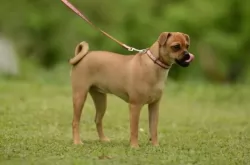 The Muggin is not a purebred dog but rather a cross breed. The hybrid dog population has exploding in the United States in the past ten to fifteen years. A lot of the success of crossbreeding can be attributed to the marketing of these dogs as “Designer Breeds”.
The Muggin is not a purebred dog but rather a cross breed. The hybrid dog population has exploding in the United States in the past ten to fifteen years. A lot of the success of crossbreeding can be attributed to the marketing of these dogs as “Designer Breeds”.
Designer breeds are developed because someone wants some of the characteristics of Breed X and some of the characteristics of Breed Y. Therefore, Designer breed XY is developed. In order to understand this hybrid dog, you need to understand the two purebred breeds they come from. The Muggin is the result of crossing the purebred Pug and the purebred Miniature Pinscher or Min Pin. So, we need to look at the origins of these two purebred breeds.
They are also referred to as Pin Pugs, Min Pin Pug, Pug Pin, Pugscher and were originally the Carlin Pinscher. However, these days there are other breeds besides the Pug and Min Pin making up the gene pool for the Carlin Pinscher. Because of this the Muggin has been separated from the Carlin Pinscher. The American Canine Hybrid Club has accepted the Muggin name for the Pug Min Pin cross.
Pugs are originally a Chinese breed and they were companions rather than working dogs of any kind. During the Han Dynasty they were the dogs of royalty. At the same time there were dogs very much like the pug in Japan and Tibet. The Pugs came to Europe by way of trades with the Dutch who then brought them to Europe. They were named the Mopshond and they caught the eye of the royalty in Europe as well.
Pugs were imported to the United States after the U.S. Civil War and in 1885 they were recognized by the American Kennel Club and called Pugs.
The Min Pin traces its origins to Germany a few hundred years ago. They were “ratters”, guarding the house and stables from all types of vermin. Most dog people believe that the Min Pin is much older than this, perhaps by thousands of years. Yet there is no detailed history to support that. Most believe the breed comes from the German Pinscher line. There might also be some Daschund and Greyhound in that line.
They were once called the Reh Pinscher. This was their name when they came to North America in 1919 and then the breed was renamed in 1972. The Miniature Pinscher Club of America was started in the early 1900’s while the AKC recognized the Min Pin in 1929. Today the Miniature Pinscher is a family dog, a companion.
The Muggin is a loving and loyal dog. All they want is for you to be happy and to share that happiness with them. They can also easily become a one person dog and bond intensely with that one person. They are not a hybrid that you can leave home alone while you go to work for 8 to 10 hours a day. No, the Muggin needs attention and lots of it. Despite this they are great with both kids and other dogs.
Because they are a cross breed, they are not recognized by the American Kennel Club. However, some hybrid registries do recognize the Muggin. These include the Designer Breed Registry, the International Designer Canine Registry, The Designer Dogs Kennel Club, the American Canine Hybrid Club, and the Dog Registry of America.
 A very athletic and elegant breed, muscular and lean, the Weimaraner is built for stamina and speed. They are a very unique looking breed, nick named the Grey Ghost due to the appearance and coloration. The breed has a very short coat that fits like skin over his bone structure. It is smooth and hard and runs from a blue-gray to silver-gray to charcoal-blue. The skin is pink not black, the coat is thin with no undercoat.
A very athletic and elegant breed, muscular and lean, the Weimaraner is built for stamina and speed. They are a very unique looking breed, nick named the Grey Ghost due to the appearance and coloration. The breed has a very short coat that fits like skin over his bone structure. It is smooth and hard and runs from a blue-gray to silver-gray to charcoal-blue. The skin is pink not black, the coat is thin with no undercoat.
They should not be black but they can be a longhaired Weimaraner, according to US AKC Breed Standards. In the AKC standards the tail is docked. This has now been changed in standards around the world as many countries are banning tail docking. They have webbed paws and striking amber, blue-gray or gray eyes. The long haired version can only be produced when both parents carry the recessive gene
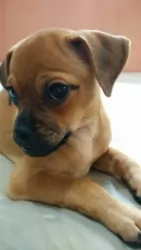 As previously mentioned, the Muggin is a cross between the Pug and the Miniature Pinscher. They are small, shave sturdy legs, floppy ears, and a wrinkled forehead for the most part. Like all hybrids however, all first generation dogs do not look the same. Some might resemble the Min Pin more and others the Pug. Some might have the stockier body of the Pug and the short tail of the Min Pin. Or one could have the Pug’s curly tail and the athletic body of the Min Pin. The snout can be short or long, the ears heavy and floppy or small and thin.
As previously mentioned, the Muggin is a cross between the Pug and the Miniature Pinscher. They are small, shave sturdy legs, floppy ears, and a wrinkled forehead for the most part. Like all hybrids however, all first generation dogs do not look the same. Some might resemble the Min Pin more and others the Pug. Some might have the stockier body of the Pug and the short tail of the Min Pin. Or one could have the Pug’s curly tail and the athletic body of the Min Pin. The snout can be short or long, the ears heavy and floppy or small and thin.
Their coats will usually be fine and short, and colors can vary a lot. They might be black and tan like a Min Pin, or more like a Pug with a solid color of cream, brown, black, white or golden. They also tend to shed quite a bit no matter which parent they take after the most. They will either have brown noses and black eyes or brown eyes and black noses or any combination of black and brown.
If Muggins are only bred to Muggins the second and third generations will resemble each other more than the first generations will. However, at this point many breeders will try to strengthen the breed by occasionally adding in to the gene pool other dog breeds.
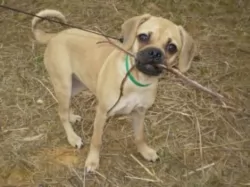 They are good with children but should be supervised.
They are good with children but should be supervised.
Energetic and loving little dogs.
Very adaptable if taken for walks or has space in a yard. Can live anywhere under those circumstances.
Very intelligent but strong willed dog. Needs strong leadership from their person.
 There are a few conditions and diseases that the Weimaraner is subject to but surprisingly for their size hip dysplasia is rarely one of them. There are prone to
There are a few conditions and diseases that the Weimaraner is subject to but surprisingly for their size hip dysplasia is rarely one of them. There are prone to
Bloat – Gastric torsion when the stomach twists itself and cuts off blood circulation and digestive processes. Bloat is deadly unless caught quickly.
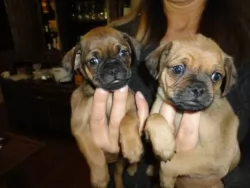 The first generation of Muggins may face all the health issues of either or both their parents, while second and third generations tend to have less health issues, They types of issues the first generation of Muggins might face include:
The first generation of Muggins may face all the health issues of either or both their parents, while second and third generations tend to have less health issues, They types of issues the first generation of Muggins might face include:
Nerve Degeneration – Degenerative Myelopathy or Dm – causes paralysis and eventually fatal.
 1 Feeding the puppy - Feed high quality dog food with high protein but not rich foods. Rich foods cause digestive issues and eating to fast, too soon before or after strenuous exercise do to threat of bloat. Also do not use the raised foot bowls as they hold an even great risk for bloat. Feed puppy 3-4 meals per day.
1 Feeding the puppy - Feed high quality dog food with high protein but not rich foods. Rich foods cause digestive issues and eating to fast, too soon before or after strenuous exercise do to threat of bloat. Also do not use the raised foot bowls as they hold an even great risk for bloat. Feed puppy 3-4 meals per day.
2.Feeding the adult Feed high quality dog food with high protein but not rich foods. Rich foods cause digestive issues and eating to fast, too soon before or after strenuous exercise do to threat of bloat. Also do not use the raised foot bowls as they hold an even great risk for bloat. Feed the adult twice a day.
4. Games and Exercises – This is a very athletic and energetic dog. They need activity and will become destructive without it. They develop separation anxiety very easily. They need both physical and mental stimulation. They are great at agility, course running, field trials and CAT.
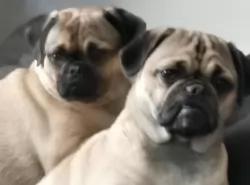 This crossbreed has a definite propensity to overeat and become obese from puppyhood. Feed the puppy a small dog dry food 3-4 times a day a total of ¾ of a cup to 1 cup.
This crossbreed has a definite propensity to overeat and become obese from puppyhood. Feed the puppy a small dog dry food 3-4 times a day a total of ¾ of a cup to 1 cup.
Again don’t over feed the adult Muggin or he will become obese easily. Feed at least twice a day one to one and half cups total.
High Energy
With the athleticism of the Min Pin taking precedence over the less active Pug, the Muggin is a fairly active dog. The Muggin is also not effective by the Pug’s difficulty with heat and cold. They love to go on long walks and need exercise to keep from being bored and destructive. However, remember there is a Pug in your Muggin and if she is not into exercise don’t try to get her to do more than she can.
You do want your Muggin to get enough exercise to fend off any tendency to be overweight. They are good at agility, jogging, obedience and watchdog activities.